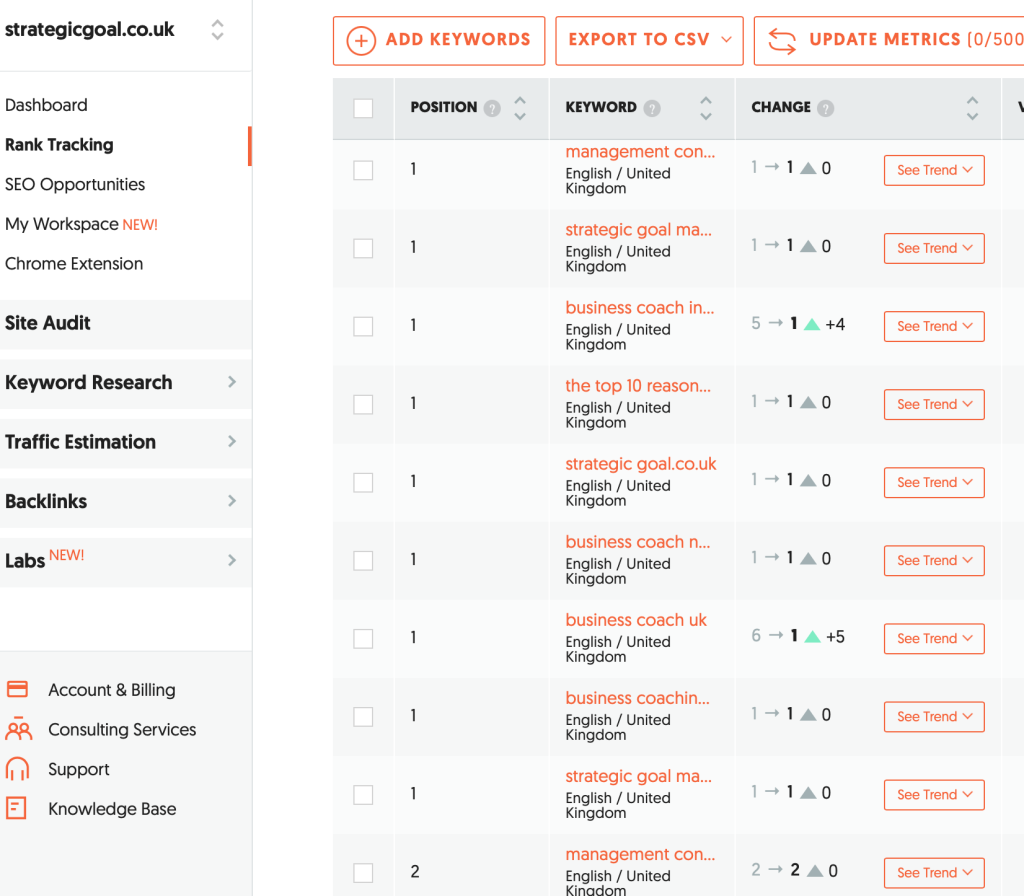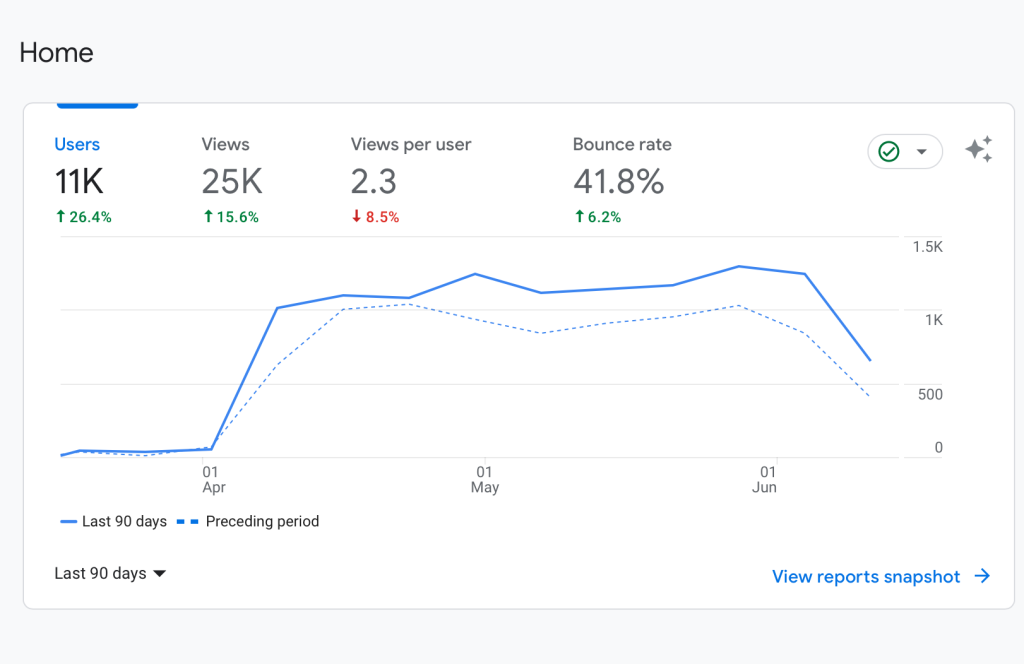Hear how I used blogging to help me rank as number 1 for ‘business coach UK’. I 100% vouch for the effectiveness of blogging for your business. This post will tell you how to do this, and I will...
Hear how I used blogging to help me rank as number 1 for ‘business coach UK’.
I 100% vouch for the effectiveness of blogging for your business. This post will tell you how to do this, and I will back everything up with examples and show you the metrics visually that demonstrate the success of blogging for businesses.

Blogging has proven to be a powerful gambit for businesses that recognise its potential to engage customers. With so many blogging platforms, companies can easily connect with new audiences and expand their brand reach. But what makes blogging such a critical component of your business strategy? And what factors should you consider when launching your blog? Read on to find out how to reach more customers by using your blog as a highly effective marketing tool that increases your business’s credibility and gravitas.
Drive Customers to Your Main Products and Services Pages from Your Blog

Putting out content related to what you’re selling allows you to advertise indirectly and seize any opportunities. By blogging regularly and promoting your posts through social media, you’ll generate quality leads that can be converted into customers. Linking your blog posts back to products or services gives potential customers a chance to take action after they view your content. Doing this will help you drive traffic from your blog back to your website, increasing the chances that a reader will purchase or perform some other desired action.
I am now using the business blog as a platform to show that I am currently ranked number 1 for ‘Business Coach in the UK’ see image above. This is relevant because the effectiveness of my blog posts demonstrated my depth and breadth of knowledge of business coaching. Furthermore, the weight of website traffic that the blog posts receive helps my main pages to rank higher because they form an effective method of topic taxonomy that allows search engines and website users to see that the subject is covered in great depth. Note the link above to my business coaching page; this is 100% contrived and strategically placed to drive people to that page. You will undoubtedly have similar pages on your website that you want customers to see. If you create helpful content regularly, you can get more visitors to your main pages to increase sales. It is simple and effective, but only if the content is of sufficient quality and value.
Create Quality Content to Establish Your Authority and Expertise

Creating quality content about your business is the first step to starting a blog for your business. However, make sure that you are not just writing content for the sake of it; target the subject matter strategically. What I mean by this is that if your primary business goal is to increase turnover through selling more websites, write about this. You should aim to provide information that potential customers find interesting and valuable. You can use your blog to show how awesome you are and why you are different from your competitors.
One thing to understand is that blogging is not a one-off fire-and-forget missile; you need to keep going with this to reap the benefits. This is my first blog in a few months, so I am conscious that I am being slightly hypocritical. However, my digital marketing strategy’s complete success meant I quickly became busy with new customers. My Insights blog helped me do this, and blogging can help your business, too.
Putting out engaging and informative posts will turn visitors into loyal readers and subscribers, allowing you to keep them returning for more. You’ll establish yourself as an authority in your industry by providing helpful advice, strategies, and insights. Producing blog posts demonstrates your industry expertise and builds your readers’ trust. You should aim to produce at least one quality blog post per month.
Increase Brand Awareness Through Blogging For Expansion Into New Markets.

Blogging can act as a way to introduce your brand to new potential customers. When you write quality blog posts and share them on social media and blogging platforms such as Quora and Medium, people in far-reaching places will see and read your content. Essentially, this makes customers in new markets aware of your product or service. They could become customers and help grow your business into new markets if they’re interested.
For example, after reading one of my blog articles, I was contacted by Oregan State University in the US, and they asked me if I could provide a backlink to their website for a particular keyword. Why did they want to link from my website, I hear you ask? They wanted the link because of the niche management consulting content from one of my posts, which ranks highly in Google. Some of you will know that to rank web pages highly in search engines, backlinks from credible websites give your site more authority and credibility, which can improve rankings.
Through blogging, I have been regularly contacted by potential international customers from places like the USA, India and several European countries. Granted, not all of these enquiries were my ideal customers; however, two were, and now I can state that I operate internationally because of this.
For every business enquiry, it is best practice to understand and record where the client heard about your business. When questioned about how they found us, the answer on several occasions this year was through your blog.
Utilise Strategic Keyword Targeting in your Business Blog To Reach New Customers.

This part of the process does require some basic search engine optimisation (SEO) knowledge to exploit this opportunity to the fullest extent. However, several free keyword tools can help you do this, such as Answer the Public and Google Trends. You should identify the keywords that internet users type when looking for your services. You can also find relevant information on Google Search Console and Google Business, provided they have been set up to track your website’s performance. Both tools help you learn the keywords typed by searchers who click on your website. You should use this information to identify the keywords that drive traffic to your site and interrogate the metrics for engagement rates and the number of conversions. Conversions can be phone calls, contact form submissions, mailing list sign-ups or whatever else you target.
Blog posts help you to rank for more keywords on your website and can help you build a content cluster of relevant topics. This strategy aims to provide engaging and valuable content that backs up your industry knowledge, drives traffic to landing pages, or creates leads.
Your Business Blog Strategy that Supports Your Organisation’s Strategic Goals

Connecting with your readers is essential; each post should have a goal, and your business blog should have an overall goal. If you are writing for the sake of it, you have got business blogging wholly wrong, and it will not be as effective.
For example, your overall blog goal could be establishing your business as the leading authority in the UK for Business Coaching. Individual blogs would then target the keywords for latent semantic indexing or other services within a content cluster, such as career coaching and business growth consulting.
Set Specific Business Blog Goals
Your business blog can target any or multiple goals to support your business strategy; a few examples are discussed below:
Engagement
Your target could be to increase the number of customers that sign up to your email list so that you market products to a captive audience about your latest offers and news.
Sales Focused
If your bog was focused purely on getting sales, there is a sometimes tricky balance between providing informative content that keeps readers engaged and trying to sell to them at the same time. It is possible, just harder to do; however, you can achieve this by writing about the benefits of your products and services and linking to the relevant sell pages.
Information/Credibility Focused
Why would you choose this strategy over sales and engagement? Giving away credible information that answers the web users’ search queries will improve your credibility. It can increase the likelihood of being linked to other websites. As discussed earlier, this can increase the visibility of your website in Google, and it represents a sound long-term strategy.
Brand Awareness
The blog below is number 1 on Google for ‘Business Coaching the Ultimate Guide,’ note that this particular blog was posted on Medium, a popular blogging platform. This blog gets international website traffic from all over the world.

Suppose you are a new company or an established brand moving into a new business location or providing a new business product or service. In that case, blogging can increase your brand awareness cheaply.
My blog posts are often viewed thousands of times monthly. It is a good vehicle for creating brand awareness, which can also be shared on social media, blogging platforms and Google Business to drive traffic to your website.

Writing and Engaging Blog Title

An engaging blog title is the gateway to your content’s success in search engines. It serves as the first point of contact between your audience and your blog post, making it a critical component of content marketing. A well-crafted title can captivate readers, pique their curiosity, and entice them to click through and explore your content further. In today’s information-saturated online world, where countless articles vie for attention, a compelling blog title can mean the difference between your content being noticed or lost in the digital noise.
Moreover, an engaging blog title drives initial traffic and plays a significant role in SEO. Search engines like Google consider the relevance and attractiveness of your title when ranking your content in search results. A carefully crafted title, rich in keywords and reflecting the essence of your content, can improve your blog’s visibility, making it more likely to appear in search results and draw organic traffic. An engaging blog title is a powerful tool for capturing your target audience’s attention, improving your content’s discoverability, and ultimately enhancing the overall impact of your blog.
Why Some Businesses Do Not Have A Blog
While blogging has become a popular marketing strategy for many businesses, not all companies engage in this practice. Several factors contribute to why they do not blog.
Firstly, resource constraints can be a significant deterrent. Maintaining a blog requires time, effort, and often a dedicated team to create high-quality, relevant content consistently. Small businesses or startups with limited personnel and budgets may prioritise other marketing channels over blogging, viewing it as a resource-intensive endeavour.
Some industries may need help to blog effectively. Businesses in highly specialised or niche markets might need help to produce regular, engaging content that appeals to a broader audience. In such cases, they may opt for alternative marketing methods that suit their industry dynamics better. However, business blogging is an opportunity to dominate their niche completely.
Furthermore, a lack of understanding about the benefits of blogging or a misconception about its effectiveness can lead some businesses to avoid it. They may need to fully grasp how blogging can establish authority, improve SEO, and foster customer engagement. In these instances, education and awareness about the advantages of blogging could change their perspective, hence this post.
Lastly, concerns about the potential for negative feedback or controversy might dissuade some businesses from blogging. Fear of negative comments or backlash can deter them from entering the online conversation, mainly if they believe the risks outweigh the potential rewards.
All of the above are valid reasons for not blogging. However, the businesses that do not blog miss out on many opportunities. This blog can raise awareness of what is possible.
Summary: Why Blogging is Important for Businesses

We have discussed the numerous benefits of business blogging, from increased sales to establishing industry credibility and growing brand awareness. The fact that the Strategic Goal Management Blog gets thousands of views monthly from mainly referral traffic and organic search demonstrates how effective blogging is at getting eyes on your business. By following the steps and information on this blog, you can make a tangible positive difference to your company’s bottom line by doing this strategically and committing time to a long-term strategy.
For help with your business blogging strategy, get in touch, and we are more than happy to help you.
The post Why Blogging Should Be Part of Your Business Strategy appeared first on Strategic Goal Management.












